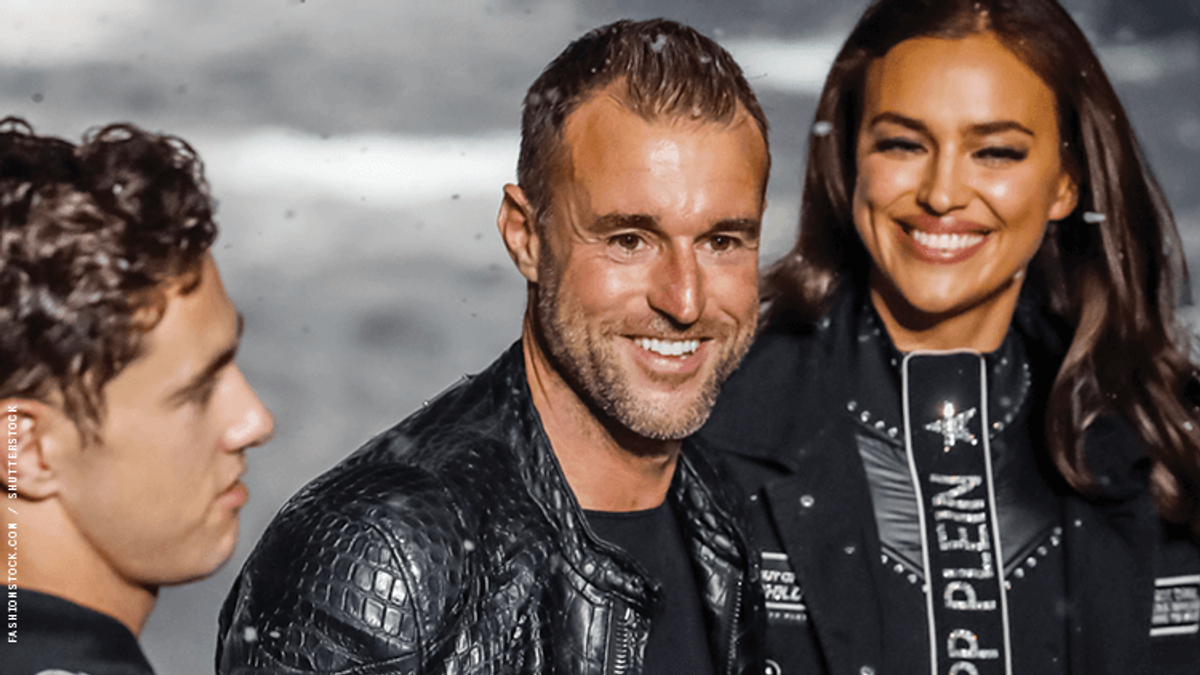A lawsuit filed in a New York court alleges that Swiss fashion designer Philipp Plein openly discriminated against LGBTQ+ people and wrongfully terminated a high-level employee simply because he was gay and living with HIV.
Amro Alsoleibi, the former employee who is now suing the American arm of the Plein brand, Philipp Plein Americas, spent over a year as a regional manager for Plein stores in the New York City area. During his tenure, the stores in Alsoleibi's region earned nearly $12 million in annual sales, according to Women's Wear Daily.
Founder of the Philipp Plein International Group, which includes the Phillip Plein, Plein Sport, and Billionaire brands, Plein is known for throwing extravagant fashion shows and over-the-top campaigns. In 2019, the brand celebrated its 20th anniversary in New York City with a party that included guests like Billy Porter, Bella Thorne, Paris Hilton, and Mickey Rourke with a performance by The Killers. He's also developed a reputation industry, body shaming a fashion critic who wrote a negative review of him that called him unprofessional.
According to Alsoleibi's complaint, this isn't the only place that issue lie as inside the company, Plein directly instructed company managers not to hire queer people.
At one point, Alsoleibi alleges Plein said plainly, "I hate to work with the gays."
Alsoleibi had a flourishing career before coming to work at Plein, having worked in sales and management for luxury brands like Valentino, Etro, and Fendi. At the time he started working for Philipp Plein Americas, Alsoleibi says the company did not know that he was gay and living with HIV.
Not long after he was hired, Alsoleibi claims he started noticing Plein's foul language toward the LGBTQ+ community that reached inappropriate levels.
According to the complaint, Alsoleibi alleges that when describing things Plein didn't like, Plein would describe it as being "too gay." He also alleges Plein went as far as to tell managers across his stores, "Don't hire gays." He later allegedly told Alsoleibi to "stop moving your hips like a gay person."
When Alsoleibi pointed out to Plein that these comments were offensive, Alsoleibi alleges Plein did not stop.
"[Plein] frequently affirmed and fostered the macho and toxic masculinity image of his business," Alsoleibi writes in his complaint. "He was very clear that this preference was not just for business branding, but also that all managers and employees must fit a certain stereotype in order to work for him."
Alsoleibi writes in the complaint that Plein's alleged harassment extended to other LGBTQ+ employees, including a gay stock clerk in California whom Alsoleibi alleges was told by Plein that he "cannot be too gay" and work in the store because the men who shop at Philipp Plein are "100 percent heterosexual."
Another gay employee claimed that Plein told him, "If you are too gay, you are unwelcome."
As a result, Alsoleibi says he noted how offensive Plein's comments were to the LGBTQ+ community through the company's internatl structures. It was then the company allegedly sent him a warning letter about his performance, which Alsoleibi believed to be "pretext" for his eventual firing in 2019.
Just before he was fired, Alsoleibi alleges the company refused his request to take time off to visit his dying father in Syria, a right given under New York's Paid Family Leave Act. Furthermore, Alsoleibi says the company cancelled his health insurance, which forced him to disclose his HIV status to his employers to express the urgency for medical coverage.
While his health insurance was reinstated, Alsoleibi claims that the company was "intrusively" monitoring his health. This lead the company to use unfair "assumptions of his health," rooted with stigma people living with HIV know all too well, to prevent him from doing his duties, which included travel.
Soon after he disclosed his HIV status, Alsoleibi alleges the company took away his clothing allowance without explanation and eventually he was shunned out of meetings, dealings, and other work-related affairs involving New York stores that would have fallen under his management.
It's important to note that people living with HIV are protected under the disability provisions of the New York State Human Rights Law, which prohibits discrimination in employment, housing, places of public accommodation, credit transactions, and certain non-sectarian educational institutions. The Human Rights Law also prohibits employers and landlords from retaliating against those who file complaints of discrimination. The law offers broader protections for those living with HIV than its federal counterpart, the Americans with Disabilities Act. For many New Yorkers living with the virus, it's the only law that provides protection.
Alsoleibi is now suing Philipp Plein Americas for unspecified damages, front and back pay, emotional distress, wrongful termination, hostile work environment, and discrimination and harassment. He also claims that Plein is in violation of New York State Human Rights Law and the Americans with Disabilities Act.
"Alsoleibi was terminated as a direct result of his sexual orientation and HIV-positive status," the complaint concluded, "and was in retaliation for his multiple complaints about defendants' unlawful employment policies and hostile work environment." Plein has yet to comment publicly about the lawsuit.
This isn't the only case Plein has dealt with recently. Plein was sued by Ferrari over a 2017 runway show in Milan where he allegedly used Ferrari cars without the company's permission. In the show, Plein was attempting to do an interpretation of the film Grease that included shooting flames, stunt performances, popping wheelies, and new color treatments.
Ferrari did not approve of the association and sued Plein for illegal use of the Ferrari brand. The designer later tried to bargain his way out of the scandal by proposing to donate to Black Lives Matter causes if Ferrari dropped the claims. They didn't.
Last October, the courts finally sided with Ferrari, forcing Plein to remove all associations with the company from Plein's website, social media, and additional platforms. Ferrari also was paid 300,000 euros in compensation.
RELATED | Rick Owens Unveils First, Historic Converse Collaboration
























































































